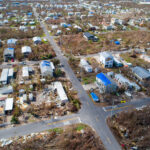Air France has said all its flights using long-haul Airbus jets will be equipped immediately with new speed sensors after last week’s disaster over the Atlantic, a pilots’ union said Tuesday.
The pitot tubes that gauge speed have become the focus of an investigation into the crash after messages showed they provided inconsistent data to the pilots and might have played a role in the June 1 crash that killed 228 people.
One Air France union urged its pilots to stop flying Airbus A330 and A340 aircraft until the old sensors were replaced and the company has since committed itself to a swift change-out, a union official said.
“Air France has provided us with an extremely proactive and very accelerated replacement program,” said Erick Derivry, spokesman for the main SNPL pilots union. “From today, all Air France A330 and A340 flights will use planes equipped with at least two new sensors out of three (on board),” he told France Info radio.
Air France, which has 19 A340s and 15 A330s, declined to comment.
The Air France A330 crashed en route from Rio de Janeiro to Paris last week after flying into stormy weather.
MORE BODIES RECOVERED
The Brazilian air force and navy said Tuesday that search teams had recovered 41 bodies from the Atlantic and moved some of them to the archipelago of Fernando de Noronha off Brazil’s northeastern coast, which is being used as a base for the search operations.
The first 16 bodies found will be flown from there to the air base in the northeastern coastal town of Recife in Pernambucano state on Wednesday afternoon, Brazil’s Navy and Air Force said in a joint statement.
The Federal Police and local authorities in Pernambucano said in a statement a team of experts would carry out a visual inspection of the bodies on Fernando de Noronha, collect DNA material and fingerprints and record details of clothes and items found on them.
Crews on Monday removed a large object from the water that an aviation expert identified as part of the plane’s tail, but officials would not comment on what it was.
Analysts say identifying the wreckage could help establish what happened but that a complete understanding of the mysterious crash will hinge on finding flight recorders that may lie on the very deep and rugged ocean floor.
A French nuclear submarine with advanced sonar equipment is due to arrive on Thursday to search for the aircraft’s “black box” recorders. The Brazilian military said France was also sending 40 tons of equipment aboard two tug boats to help scour for wreckage.
The jet sent 24 automated messages in its final minutes on June 1, detailing a rapid series of system failures.
The Alter union, which represents 15 Air France pilots, said in a statement that the first of these messages pointed to a problem with the pitot tubes.
ICED-UP TUBES
The pitot tubes are small probes on the exterior of the fuselage that measure the pressure of air rushing into them and thereby gauge the plane’s speed.
The French air accident agency has said it is too early to pinpoint any possible cause for the crash but noted there were apparent problems with the jet’s speed readings.
This has fueled speculation that its pitot tubes may have iced up, feeding wrong data into the cockpit, which might have confused the plane’s fly-by-wire computer system and its pilots.
Air France said on the weekend it had noticed icing problems on the speed sensors in May 2008 and had asked Airbus for a solution to reduce or overcome the difficulty.
Airbus responded by reaffirming existing operating procedures, according to Air France in a statement on Saturday.
Air France said tests had later convinced it that probes developed for another model would be more efficient and that it had decided to go ahead and start fitting them from April 27 without waiting for further testing proposed by the plane maker.
The A330 that crashed had not yet been modified. Airbus has declined to comment on the Air France statement.
Airbus Chief Executive Tom Enders told reporters in Munich on Tuesday his company was working closely with authorities and was keeping clients informed.
(Additional reporting by Jean-Baptiste Vey, Peter Maushagen; Fernando Exman in Recife and Brian Ellsworth in Rio; editing by Stuart Grudgings, Bill Trott and Eric Walsh)
Topics Aviation
Was this article valuable?
Here are more articles you may enjoy.


 4,800 Claims Handled by Unlicensed Adjusters in Florida After Irma, Lawsuit Says
4,800 Claims Handled by Unlicensed Adjusters in Florida After Irma, Lawsuit Says  Berkshire’s Jain on Cyber: ‘The Mindset Should Be You’re Not Making Money’
Berkshire’s Jain on Cyber: ‘The Mindset Should Be You’re Not Making Money’  Travelers to Open Technology Office in Atlanta
Travelers to Open Technology Office in Atlanta  Berkshire’s ‘Most Important’ Biz Drives Q1 Results; GEICO Still Behind on Tech
Berkshire’s ‘Most Important’ Biz Drives Q1 Results; GEICO Still Behind on Tech 

